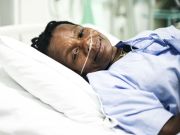By E.J. Mundell
HealthDay Reporter

FRIDAY, Aug. 21, 2020 (HealthDay News) -- The antiviral drug remdesivir has been one of the few treatments that's seemed to help curb death rates in COVID-19 patients so ill that they need a ventilator.
But a new study finds the drug might not be as effective for "moderate" cases of COVID-19 -- patients hospitalized and perhaps needing oxygen to breathe, but not requiring a ventilator.
The study of nearly 600 such patients found that those who got a five-day course of remdesivir had a "statistically significant difference in clinical status compared to standard care, but the difference was of uncertain clinical importance," according to researchers led by Dr. Diana Brainard of Gilead Sciences, which makes remdesivir.
One infectious disease expert believes the findings may temper the excitement that first emerged around remdesivir.
"This study highlights that remdesivir clearly isn't a path-breaking drug when it comes to the treatment of COVID-19, as its benefits are marginal," said Dr. Amesh Adalja, a senior scholar at the Johns Hopkins Center for Health Security in Baltimore.
He believes the findings "underscore the need to develop antivirals and other therapies that can meaningfully impact the trajectory of COVID-19 patients."
Gilead is currently seeking U.S. Food and Drug Administration approval for remdesivir, which is available now on an emergency basis for hospitalized patients with severe COVID-19. If the FDA approves it, however, the drug would gain wider use.
Remdesivir works by blocking the virus from copying itself. Trials of the drug showed that it can cut recovery time from COVID-19 by nearly a third in people with severe COVID-19.
But what about more moderate coronavirus cases? To find out, Brainard's group looked at 584 hospitalized patients who received either five days of remdesivir administered intravenously; 10 days on the same regimen, or standard care without remdesivir.
Patients averaged 57 years of age and 61% were men. More than half had heart disease and 40% were diabetic. All of the patients had moderate COVID-19, which was defined as the presence of pneumonia evidenced on lung scans along with low blood oxygen levels.
As reported Aug. 21 in the Journal of the American Medical Association, 28 days after treatment began, four patients (2%) in the standard care group had died, compared to three (2%) who got 10 days of remdesivir and two (1%) who got the five-day regimen.
At 11 days, a statistical benefit in terms of a "better clinical status" on a 7-point scale was only seen among those who got five days of remdesivir: This group had a 65% higher odds of an improved outcome compared to those who got standard care, the researchers said.
Still, improvements were not dramatic and of "uncertain clinical importance," Brainard's team noted.
According to Adalja, more study is needed and "there may still be a role for remdesivir in certain patient subgroups in which the benefits may be more apparent."
Dr. Matthew Heinz is a hospital physician and internist from Tucson, Ariz. Reading over the report, he agreed that while remdesivir may help some patients with severe COVID-19, "there was [only] a small benefit for the ones taking the five-day course" in this study of people with moderate illness.
Heinz offered up one more caveat: the drug's hefty price tag. In late June, Gilead announced that it would charge U.S. hospitals $3,120 for a five-day course of remdesivir in a patient with private insurance.
Remdesivir "is very costly, and not every hospital is able to consistently stock it," Heinz said, and before hospitals rush to buy the drug, "more study is definitely required."
More information
For the latest updates on COVID-19, visit the U.S. National Institutes of Health.
Back

The news stories provided in Health News and our Health-E News Newsletter are a service of the nationally syndicated HealthDay® news and information company. Stories refer to national trends and breaking health news, and are not necessarily indicative of or always supported by our facility and providers. This information is provided for informational and educational purposes only, and is not intended to be a substitute for medical advice, diagnosis, or treatment.






